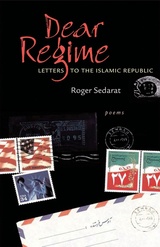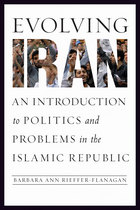
In his provocative, brave, and sometimes brutal first book of poems, Roger Sedarat directly addresses the possibility of political change in a nation that some in America consider part of “the axis of evil.” Iranianon his father’s side, Sedarat explores the effects of the Islamic Revolution of 1979—including censorship, execution, and pending war—on the country as well as on his understanding of his own origins. Written in a style that is as sure-footed as it is experimental, Dear Regime: Letters to the Islamic Republic confronts the past and current injustices of the Iranian government while retaining a sense of respect and admiration for the country itself. Woven into this collection are the author’s vividdescriptions of the landscape as well as the people of Iran. Throughout, Sedarat exhibits a keen appreciation for the literary tradition of Iran, and inmaking it new, attempts to preserve the culture of a country he still claims as his own.
Thigh
With honesty of homemade butter,
paddle-churned cream (eshta in Arabic,
ecstasy foaming to the brim), a woman
river-bathes, sheet of oil-black hair breaking
in rapids, cut lemon scintillating
olive skin free of tree-stumped chador, skirts
within skirts, peal of her bell-body rung
muffled in Iran heat—a splash of white.
The rhythm of pumice scraping her feet,
sandbar against warm current, frothy cape
a bee-bubbled hive, honeyed trace curling
to her bare knees, thick transparent lather.
At a Tehran bazaar endless gold-stores
could never return me anywhere pure.

Evolving Iran presents an overview of how the politics and policy decisions in the Islamic Republic of Iran have developed since the 1979 revolution and how they are likely to evolve in the near future. Despite the fact that the revolution ushered in a theocracy, its political system has largely tended to prioritize self-interest and pragmatism over theology and religious values, while continuing to reinvent itself in the face of internal and international threats.
The author also examines the prospects for democratization in Iran. Since the early years of the twentieth century, Iranians have attempted to make their political system more democratic, yet various attempts to produce a system where citizens have a meaningful voice in political decisions have failed. This book argues that greater democratization is unlikely to occur in the short term, especially in light of increased threats from the international community.
This accessible overview of Iran’s political system covers a broad array of subjects, including foreign policy, human rights, women’s struggle for equality, the development and evolution of elections, and the institutions of the political system including the Revolutionary Guards and Assembly of Experts. It will appeal to undergraduates and the general public who seek to understand a country and regime that has mystified Westerners for decades.
READERS
Browse our collection.
PUBLISHERS
See BiblioVault's publisher services.
STUDENT SERVICES
Files for college accessibility offices.
UChicago Accessibility Resources
home | accessibility | search | about | contact us
BiblioVault ® 2001 - 2024
The University of Chicago Press









